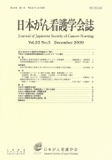Japanese
English
- 販売していません
- Abstract 文献概要
- 参考文献 Reference
- サイト内被引用 Cited by
要旨
本研究は,終末期のがん患者を看病するという配偶者のストレスフルな体験について,そのストレス—対処過程に焦点を当て,配偶者のその場その時の状況認識とそれらの状況認識がもたらすストレス—対処過程の特徴/パターンを明らかにすることを目的として行った.緩和ケア病棟に入院中のがん患者の配偶者12名を対象として半構成的なインタビュー調査を行い,得られたデータを質的帰納的に分析した.
分析の結果,終末期がん患者を看病する配偶者のストレス—対処過程に関連する6つのカテゴリー:《つらくてしかたがない状況の特徴》,《つらくてしかたがない原因》,《患者のために尽くすという気持ちを起こさせる機能》,《患者のために尽くす方法》,《現状を受け入れる理由》,《現状を受け入れた結果》が明らかになった.本研究では,終末期がん患者の配偶者は,“つらくてしかたがない”という言葉で象徴されるストレスフルな状況におかれていた.しかし配偶者は,患者のために尽くし,現状を受け入れることでこのストレスフルな状況に対処していた.その結果,配偶者は患者に尽くし続けるとか,尽くすことの意味を感じるようになり,心身の安定を取り戻すことができるようになることが示された.
Abstract
The purpose of this study was to clarify the characteristics and patterns of stress and the coping process of 12 spouses who experienced stressful events such as caring for their partners in the terminal stage of cancer at a palliative care unit. The focus was on the stress coping process as a result of situation recognition. Data were collected through semi.structured interviews and then analyzed qualitatively and inductively.
As a result of this analysis, 6 categories were identified found in the expression of the characteristics and patterns of stress and the coping process of the spouses who face stressful situations: " the characteristics of the situation that forced them to become bitter", "the reasons why they fell into that state of mind", "the mechanism through which the spouses came to feel that they do the best for patients", "the method by which they make an effort for patients", "the reason for accepting the present situation", and "the result after having accepted the present situation". The results of this study showed that spouses who were caring for their partners in the terminal stage of cancer were experiencing a stressful situation that was symbolized by "the feeling of being forced into bitterness". However, spouses were coping with such stressful situations by doing their best for the patients and by accepting the present situation. As a result, spouses could continue to do their best for the patients, feel the meaning of doing the best for patients, and regain their stability of mind and body.
Copyright © 2009, Japanese Society of Cancer Nursing All rights reserved.


